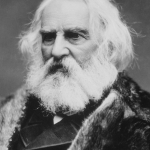‘They toil not, neither do they spin.’
One morn before me were three figures seen,
With bowèd necks, and joinèd hands, side-faced;
And one behind the other stepp’d serene,
In placid sandals, and in white robes graced;
They pass’d, like figures on a marble urn,
When shifted round to see the other side;
They came again; as when the urn once more
Is shifted round, the first seen shades return;
And they were strange to me, as may betide
With vases, to one deep in Phidian lore.
How is it, Shadows! that I knew ye not?
How came ye muffled in so hush a mask?
Was it a silent deep-disguisèd plot
To steal away, and leave without a task
My idle days? Ripe was the drowsy hour;
The blissful cloud of summer-indolence
Benumb’d my eyes; my pulse grew less and less;
Pain had no sting, and pleasure’s wreath no flower:
O, why did ye not melt, and leave my sense
Unhaunted quite of all but—nothingness?
A third time pass’d they by, and, passing, turn’d
Each one the face a moment whiles to me;
Then faded, and to follow them I burn’d
And ached for wings, because I knew the three;
The first was a fair Maid, and love her name;
The second was Ambition, pale of cheek,
And ever watchful with fatiguèd eye;
The last, whom I love more, the more of blame
Is heap’d upon her, maiden most unmeek,—
I knew to be my demon Poesy.
They faded, and, forsooth! I wanted wings:
O folly! What is Love? and where is it?
And for that poor Ambition! it springs
From a man’s little heart’s short fever-fit;
For Poesy!—no,—she has not a joy,—
At least for me,—so sweet as drowsy noons,
And evenings steep’d in honey’d indolence;
O, for an age so shelter’d from annoy,
That I may never know how change the moons,
Or hear the voice of busy common-sense!
And once more came they by:—alas! wherefore?
My sleep had been embroider’d with dim dreams;
My soul had been a lawn besprinkled o’er
With flowers, and stirring shades, and baffled beams:
The morn was clouded, but no shower fell,
Tho’ in her lids hung the sweet tears of May;
The open casement press’d a new-leaved vine,
Let in the budding warmth and throstle’s lay;
O Shadows! ’twas a time to bid farewell!
Upon your skirts had fallen no tears of mine.
So, ye three Ghosts, adieu! Ye cannot raise
My head cool-bedded in the flowery grass;
For I would not be dieted with praise,
A pet-lamb in a sentimental farce!
Fade softly from my eyes, and be once more
In masque-like figures on the dreamy urn;
Farewell! I yet have visions for the night,
And for the day faint visions there is store;
Vanish, ye Phantoms! from my idle spright,
Into the clouds, and never more return!


















Comment form: